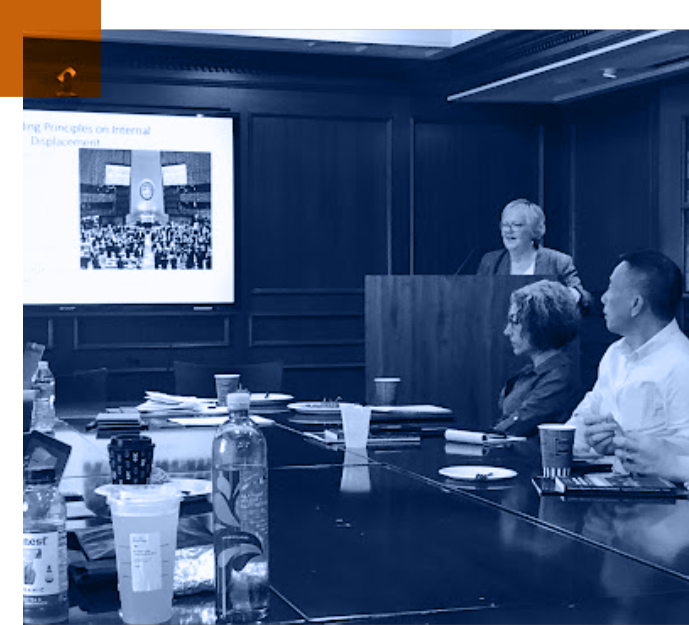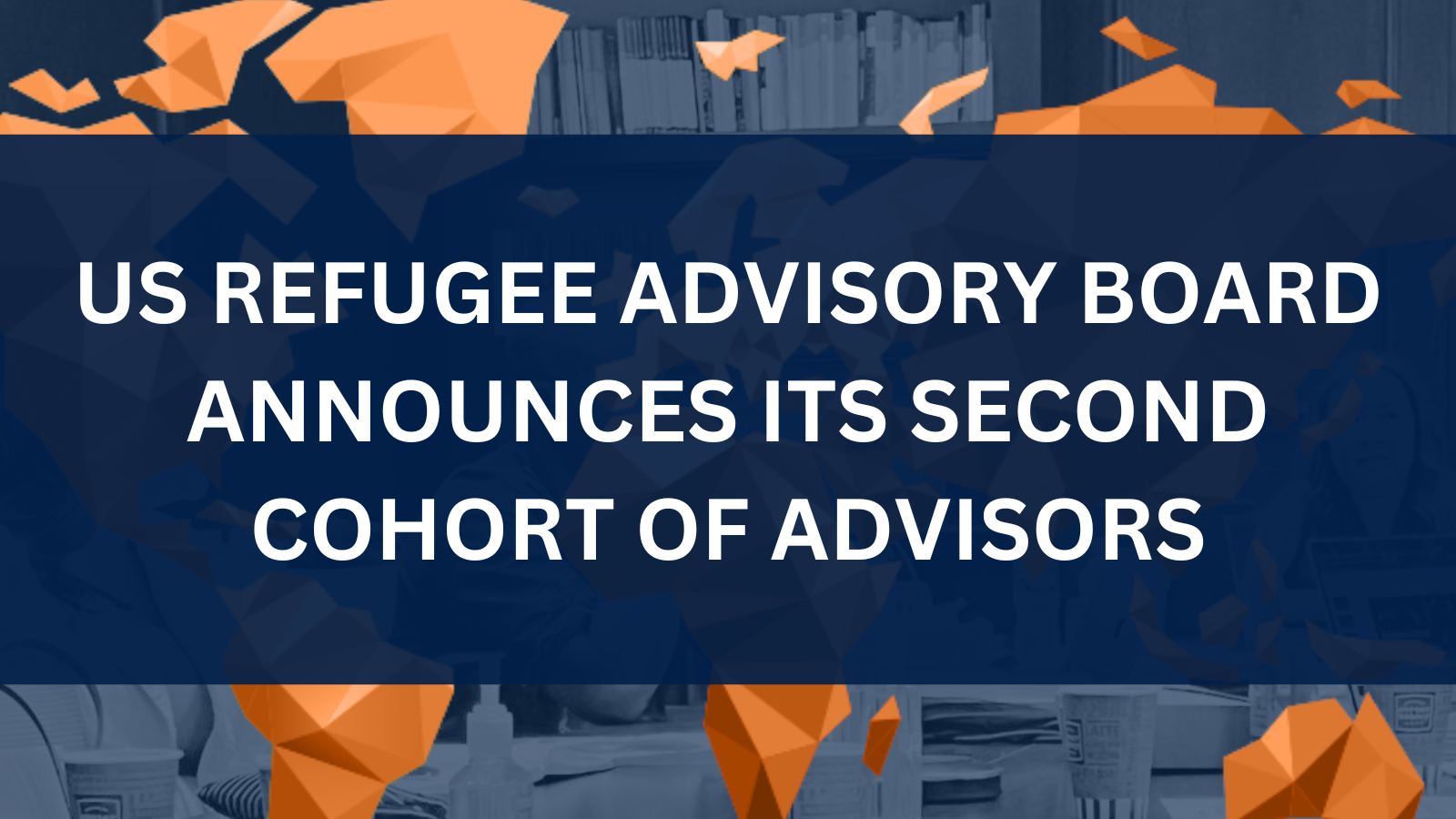
The United States Refugee Advisory Board
The United States is strengthening its role as a humanitarian leader in refugee protection and resettlement, and engagement with the multilateral international community to ensure an effective global response system. As U.S. leadership grows, it is critical that we empower those with direct lived experience in forced displacement and ensure that they have a strong voice in policies affecting them. This is the reason the US Refugee Advisory Board was created.
About USRAB
Launched in partnership with Refugee Congress, Refugee Council USA (RCUSA), and Georgetown University’s Institute for the Study of International Migration (ISIM), USRAB serves to channel the participation of all current and former forcibly displaced populations in the US to relevant regional and international policy bodies, thus providing a mechanism to ensure there is meaningful engagement in policies affecting them.
In addition to engaging with key international non-governmental organizations, USRAB will work in collaboration with other refugee-led initiatives, including Refugees Seeking Equal Access at the Table (R-SEAT).
USRAB was built by a Co-Design Committee comprised of experts and refugee and asylum practitioners spanning academic, advocacy, and policy expertise. Institutionally housed and staffed at Refugee Congress, USRAB is led by a governing Executive Committee, comprised of staff from the three partner organizations, the USRAB Chair, and USRAB Deputy Chairs.
Why was USRAB created?
Historically, refugees, asylees, and other forcibly displaced people have had little engagement in decision-making spaces that work towards durable solutions and protection, despite being the communities most directly impacted.
Furthermore, people with those lived experiences have faced barriers to accessing training on refugee policy and advocacy, and frequently encounter misconceptions about the many crucial contributions that refugees make to local, state, national, and global communities.
USRAB was created to address these barriers. We believe that engaging and empowering those with lived experience in displacement will lead to better and more effective humanitarian protection programs and solutions.
USRAB Governance
USRAB was built by a Co-Design Committee comprised of experts and refugee and asylum practitioners spanning academic, advocacy, and policy expertise. Institutionally housed and staffed at Refugee Congress, USRAB is led by a governing Executive Committee and newly adopted bylaws, and comprised of staff from the three partner organizations, the USRAB Chair, and USRAB Deputy Chairs.
What do USRAB Advisors do?
USRAB Advisors serve a three-year term and contribute their expertise to create better and more equitable solutions for refugees and other forcibly displaced people.
Advisors attend an intensive weeklong USRAB Training Program (UTP) at Georgetown University in Washington DC to prepare advisors for their roles.
- Advisors participate in collaborative spaces devoted to programs and policies that impact forcibly displaced people and, as needed and invited by the US government, in US delegations to multilateral policy meetings.
- Advisors engage directly with refugees, asylees, and other forcibly displaced populations in the United States to inform USRAB priorities.
- Advisors attend an intensive weeklong USRAB Training Program (UTP) at Georgetown University in Washington DC to prepare advisors for their roles.
USRAB Advisors
-

Basma Alawee
-

Faith Akovi Cooper
-

Nabin Dhimal
-

Kendra Frith
-

Bahati Kanyamanza
-

Mohammed Naeem
-

Dauda Sesay
-

Nejra Sumic
-

Hourie Tafech
-

Emma Yaaka
-

Ayda Zugay
What is the USRAB Training Program?
Advisors begin their terms by participating in an intensive weeklong USRAB Training Program (UTP) led by Georgetown University’s Institute for the Study of International Migration and designed in partnership with USRAB’s Co-Design Committee. The course includes overview lectures, conversations with refugee advocates, simulation exercises, and several guest speakers.
- The program provides background on international networks, global governance, key actors, advocacy tools and policy-making processes.
- The program enhances the capacity of refugees participating in the governance of the global refugee regime to drive impact.
How does USRAB represent forcibly displaced communities in the US?
USRAB’s agenda and priorities will be directly informed by the needs and interests of all forcibly displaced communities across the US, including refugees, asylees, stateless individuals, and others.
USRAB will provide regular opportunities for discussion and feedback to ensure that its strategic priorities consistently represent the broader interests of those who have directly experienced forced displacement.

How do I become an USRAB Advisor?
An open call for applications to USRAB will take place annually and is open to US-based leaders with lived forced displacement experience, Generally, the USRAB Governing Council looks for applicants that have:
- Demonstrated knowledge and understanding of the interests and concerns of diverse forcibly displaced populations.
- Previous experience serving on boards, committees, or other similar advisory roles.
- Previous experience engaging with government agencies and NGOs in policy and/or advocacy or organizing work.
- A demonstrated commitment to and experience with community engagement and advocacy.
USRAB is committed to ensuring a representative group of individuals who have lived forced displacement experience as well as diversity in background, countries of origin, gender, and other areas of inclusion.
USRAB Advisors will have all travel and other related costs covered for participation in the Refugee Training Program and other USRAB-related convenings, as needed.
News + Resources
The US Mission in Geneva: “U.S. Plenary Statement UNHCR Executive Committee”
The US Mission in Geneva: “Refugee Voices - Basma Alawee at UNHCR EXCOM”
US Department of State, “Remarks at the Annual Tripartite Consultations on Resettlement.”
Resources from Refugees Seeking Equal Access at the Table.
The US Mission in Geneva: “A Focus on the Voice of Refugees.”
Refugee Advocacy Lab: “10 Best Practices for Engaging with Refugee Leaders.”
Contact us to Learn more
For additional questions , please contact USRAB Project Manager, Zane Khalibaeva at gulzeyin.khalibaeva@refugeecongress.org.
















